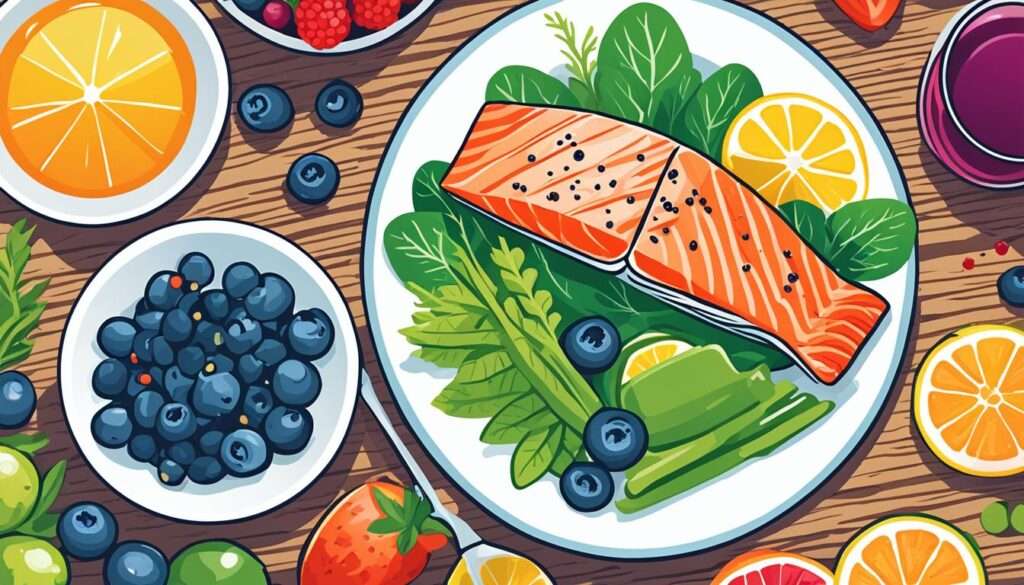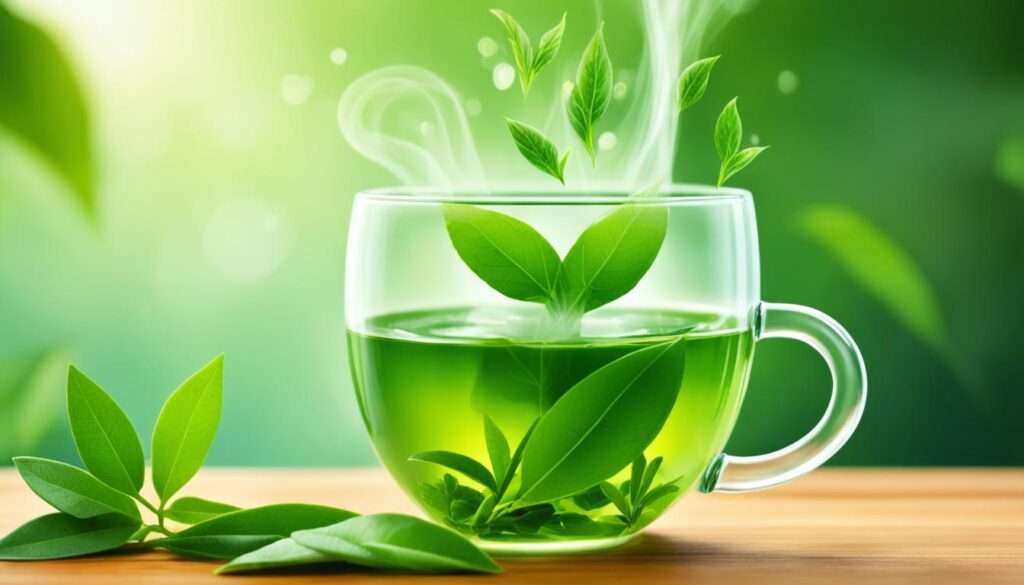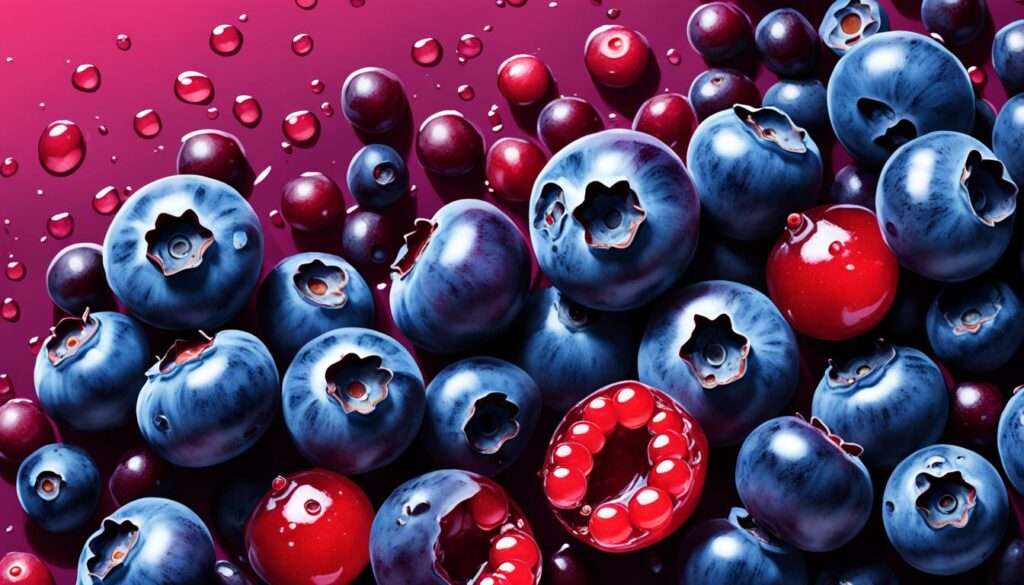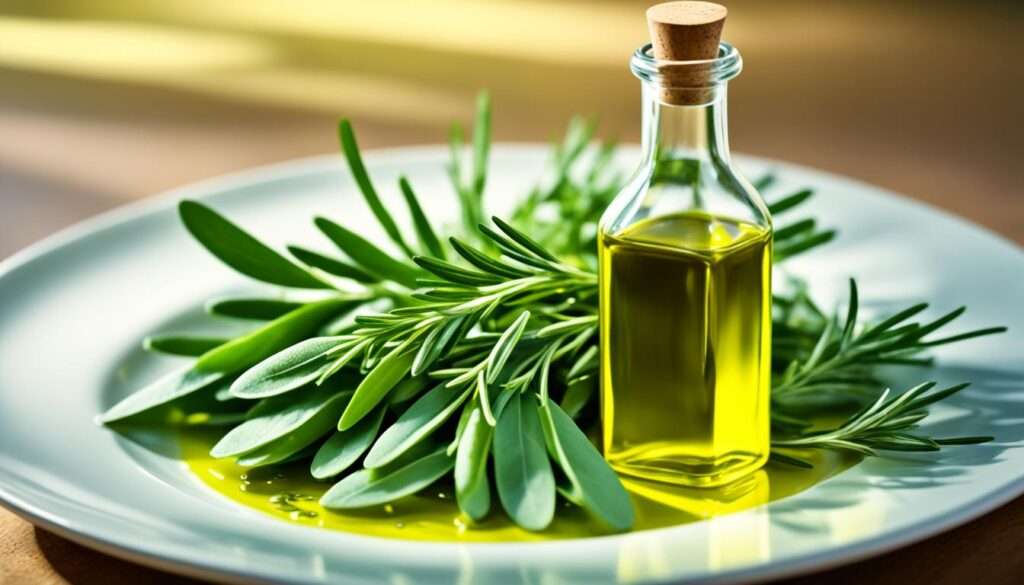Your liver does a lot for you, like making proteins and breaking down toxins. It’s key for your health. Eating foods rich in nutrients can help keep it working well.
Table of Contents
ToggleThis article will talk about foods good for liver. You’ll learn about coffee, tea, berries, grapes, and fatty fish. These foods are tasty and can protect your liver.
If you want to prevent liver disease or boost your liver’s health, this guide is for you. It will show you how to make smart food choices. Let’s dive into the benefits of eating nutrient-rich foods for your liver.
The Importance of a Healthy Liver
The liver is a key organ that does many important jobs for your body. It makes proteins, cholesterol, and bile, and stores vitamins and minerals. It also breaks down toxins like alcohol and some medicines. Keeping your liver healthy is key to feeling good overall.
Understanding the Liver’s Crucial Functions
Your liver is the biggest organ inside you. It’s vital for many important tasks. It helps control your blood sugar, breaks down fats, and makes proteins for blood clotting. It also filters out bad stuff from your blood, keeping you healthy.
Risks of Liver Disease and Its Impact on Overall Health
Liver disease can lead to serious problems like cirrhosis, fatty liver disease, and liver cancer. These diseases can cause fatigue, weight loss, and even organ failure. It’s important to protect your liver health to avoid these risks.
Knowing how the liver works and the dangers of liver disease helps you take care of it. By doing so, you can live a healthier life.
Juice and Foods Good For Liver
Keeping your liver healthy is key to feeling good overall. What you eat greatly affects your liver’s health. Some foods and drinks are great for your liver because they’re full of antioxidants and fiber. Let’s look at the top foods and drinks that help your liver stay healthy.
Antioxidant-Rich Options like Coffee, Tea, and Berries
Coffee and tea are great for your liver. Drinking coffee can lower the risk of liver problems like cirrhosis and cancer. Green tea helps reduce liver enzymes in people with non-alcoholic fatty liver disease (NAFLD). Berries, like blueberries and cranberries, are full of antioxidants. They can protect your liver from harm.
Fiber-Packed Choices Such as Oatmeal and Cruciferous Vegetables
Oatmeal and veggies like broccoli and Brussels sprouts are good for your liver too. They’re full of fiber and nutrients. These can help your liver work better and lower the risk of liver diseases.

Adding these foods and drinks to your diet helps your liver do its job well. It’s a way to keep yourself healthy overall.
Coffee: A Surprising Ally for Liver Protection
Your morning coffee might be more than just a wake-up call. Studies show it can help keep your liver healthy. Drinking coffee regularly could lower the risk of chronic liver diseases and even liver cancer.
Coffee helps by stopping fat and collagen from building up in the liver. These are signs of liver disease. It also has antioxidants that fight off harmful free radicals and protect liver cells. Drinking at least 3 cups of coffee a day seems to offer the most benefits for liver health.
Coffee doesn’t just stop at preventing liver damage. It’s also linked to a lower risk of cirrhosis in those with chronic liver disease. This is because coffee reduces inflammation and helps the liver work better.
If you want to support your liver health, think about drinking coffee more often. Just remember to drink it in moderation and eat a balanced diet. Adding coffee to your daily routine can help your liver stay healthy.
The Power of Green Tea for Liver Enzymes
Coffee is known for its benefits for the liver, but tea also has great benefits. Green tea is especially good for your liver health. It helps liver enzymes, which show how well your liver is working.
Benefits of Green Tea Consumption for NAFLD Patients
A review of 15 studies showed that drinking green tea can lower liver enzymes in NAFLD patients. NAFLD means too much fat in the liver, which can cause inflammation and damage. Green tea can help by reducing enzymes like ALT and AST.
Another study found that green tea extract helped lower ALT and AST levels in NAFLD patients for 12 weeks. A 2017 review also showed that drinking green tea can lower the risk of liver cancer. The lowest risk was in those drinking four or more cups a day.
But, high doses of green tea extract can cause liver damage in rare cases. Always talk to your doctor before adding green tea to your diet, especially if you have liver issues.

Grapefruit: A Citrus Superfood for Liver Health
Grapefruit is more than just a tasty breakfast addition. It’s also great for your liver health. It’s full of antioxidants that help your liver work better and prevent diseases.
Naringenin and naringin are two key antioxidants in grapefruit. They help reduce inflammation and protect liver cells. A study found they might even stop liver fibrosis, a condition where too much tissue builds up in the liver.
While we haven’t studied grapefruit’s direct effects on the liver much, the research looks promising. Eating grapefruit could be a natural way to keep your liver healthy. It might even help prevent liver damage and diseases.
Grapefruit is a top choice for liver health. It’s packed with antioxidants, vitamins, and minerals. Adding grapefruit to your diet can boost your liver health and help prevent diseases. So, try having a grapefruit every day for better health.
Blueberries and Cranberries: Antioxidant Powerhouses
If you want to boost your liver health, consider eating more blueberries and cranberries. These berries are full of antioxidants that help your liver. They are great for your health.
Blueberries and cranberries are loaded with anthocyanins. These antioxidants make the berries colorful. Studies show that anthocyanins can improve liver function. A 2021 study found cranberry supplements helped people with non-alcoholic fatty liver disease.
Blueberry extract might also slow down liver cancer cell growth. But, we need more research to be sure. Eating blueberries and cranberries is an easy way to help your liver.

For a liver-friendly diet, add these berries to your smoothies, snack on them, or use them in recipes. The more antioxidants you eat, the better your liver will work.
Grapes and Their Liver-Friendly Compounds
Grapes, especially the deep-hued red and purple types, are packed with compounds that can help the liver. These compounds may fight inflammation, protect cells, and boost antioxidants in the body.
A 2020 study in rats showed that grapes and grape juice helped the liver. They reduced inflammation and boosted antioxidants. But a 2022 study in humans found no big changes in liver enzymes or function from eating grape products. Still, grapes are full of nutrients that can support a healthy liver.
The Benefits of Grape Seed Extract
Grape seed extract is another good part of grapes. Studies in animals suggest it can help with liver disease symptoms. It’s an antioxidant that fights inflammation and oxidative stress, which can harm the liver and lead to NAFLD.
More studies are needed to prove grape seed extract’s benefits for humans. But its anti-inflammatory and antioxidant effects are promising. Adding grapes, grape juice, and grape seed extract to your diet could support your liver health.
foods good for liver
Keeping a diet rich in nutrients is key for your liver’s health and function. Adding certain foods to your daily meals helps your body get the nutrients it needs. This keeps your liver working well.
Some top foods good for your liver are:
- Berries: Full of antioxidants, berries like blueberries and cranberries fight inflammation. They protect the liver from damage.
- Green tea: It has compounds that manage liver enzymes. This can help those with non-alcoholic fatty liver disease (NAFLD).
- Grapefruit: This citrus fruit boosts liver function and supports liver health.
- Grapes and grape seed extract: Polyphenols in grapes and their seeds improve liver health. They increase enzyme levels and lower inflammation.
A balanced diet with fiber, healthy fats, and lean proteins also helps your liver. Making smart food choices nourishes your liver. It’s a big step towards better health and wellness.
Fatty Fish: Omega-3s for Liver Support
Fatty fish like salmon, sardines, and mackerel are great for a healthy liver. They are full of omega-3 fatty acids. These fats are good for you because they fight inflammation. A 2016 study showed that omega-3s can lower liver fat and triglycerides in people with NAFLD or non-alcoholic steatohepatitis.
Omega-3s do more than just help with liver health. A 2021 study found they might lower the risk of liver cancer. But, it’s key to keep the right balance of omega-3 and omega-6 fats in your diet. Too much of one can harm your liver.
To help your liver, eat more fatty fish. Also, eat less omega-6 fats. This will lead to a healthier liver.
Olive Oil: A Healthy Fat for Liver Function
Olive oil is a top choice for supporting liver health. It’s a versatile and tasty fat that brings many benefits for the liver. Studies show that adding olive oil to your meals, especially in the Mediterranean diet, can greatly improve liver function.
The Mediterranean Diet’s Positive Impact on the Liver
The Mediterranean diet is known for its heart health benefits and is also good for the liver. It’s full of olive oil, fruits, veggies, whole grains, and lean proteins. A 2018 study found that older adults eating a Mediterranean diet with lots of olive oil were less likely to get fatty liver.
Olive oil’s healthy fats and antioxidants are key to its benefits. Its monounsaturated fatty acids and polyphenols help stop fat from building up in the liver. This is a major factor in liver disease. Plus, its anti-inflammatory effects help protect the liver.

Research also shows that eating olive oil regularly can improve liver enzymes in the blood. This means better liver function, especially for those at risk of liver disease or already facing liver health issues.
Adding olive oil to your daily meals is an easy way to help your liver. Use it for cooking, dressings, or as a dip for bread. When you eat a balanced Mediterranean-style diet with olive oil, you get many health benefits, not just for your liver but overall health and wellness.
Nuts and Their Protective Effects on the Liver
Eating nuts can help keep your liver healthy. These tasty treats are full of healthy fats, antioxidants, and vitamin E. These nutrients can improve how your liver works.
A study in 2019 showed that eating more nuts can lower the risk of NAFLD. This is a common liver condition. More studies are needed, but nuts seem to protect the liver and prevent liver disease.
Here are some key nutrients in nuts that are good for your liver:
- Healthy fats: Almonds, walnuts, and pecans are full of good fats. These fats can reduce inflammation and help your liver work better.
- Antioxidants: Nuts have lots of antioxidants like vitamin E and polyphenols. These can fight off harmful free radicals and protect your liver from damage.
- Fiber: The fiber in nuts helps with digestion and supports the liver’s detox process.
Adding nuts to your diet can be a great way to support your liver health. It can also lower your risk of NAFLD. So, enjoy a handful of nuts as a tasty snack that’s good for your liver.
Conclusion
Keeping your liver healthy is key to feeling good overall. Eating foods that are good for your liver can really help. We’ve looked at foods like coffee, tea, berries, fatty fish, olive oil, and grapes. These foods are full of antioxidants and protect your liver.
By choosing to eat these foods and living a healthy lifestyle, you can help your liver work better. This means eating right, staying at a healthy weight, and drinking less alcohol. While no single food can fix liver problems, eating well is a big part of staying healthy.
Your liver works hard for you and needs your care. Eating foods that support your liver helps your body work its best. This supports your health and well-being overall.
FAQ
What are the key functions of the liver?
The liver makes important proteins, cholesterol, and bile. It also stores vitamins and minerals. Plus, it breaks down toxins like alcohol and some medicines.
What are the risks of liver disease?
Liver diseases like cirrhosis and liver cancer can harm your health. It’s important to keep your liver healthy.
How can coffee support liver health?
Drinking coffee can lower the risk of cirrhosis and liver cancer in those with chronic liver disease. It may also prevent fat and collagen buildup, which are signs of liver disease.
What are the benefits of green tea for liver health?
Green tea can lower liver enzymes in people with non-alcoholic fatty liver disease (NAFLD). It may also reduce the risk of liver cancer.
How can grapefruit support liver health?
Grapefruit has antioxidants like naringenin and naringin. These can reduce inflammation and protect liver cells. They may also stop the buildup of connective tissue in the liver.
What are the liver-health benefits of berries?
Blueberries and cranberries are full of anthocyanins. These antioxidants can improve fatty liver disease and may stop liver cancer cells from growing.
How can grapes and grape products support liver health?
Grapes, especially red and purple ones, have compounds that may lower inflammation and prevent cell damage. They could also increase antioxidants in the liver. But, more studies are needed to confirm this.
What are the liver-health benefits of fatty fish?
Fatty fish like salmon, sardines, and mackerel are full of omega-3 fatty acids. These have anti-inflammatory effects and can reduce liver fat and triglycerides in people with NAFLD.
How can olive oil support liver health?
Eating a Mediterranean diet with lots of olive oil can lower the risk of fatty liver disease in older adults. Olive oil’s healthy fats and antioxidants may prevent liver fat buildup.
What are the liver-health benefits of nuts?
Nuts are packed with healthy fats, antioxidants, and vitamin E. These can improve liver health. Eating more nuts may also lower the risk of non-alcoholic fatty liver disease (NAFLD).
Source Links


